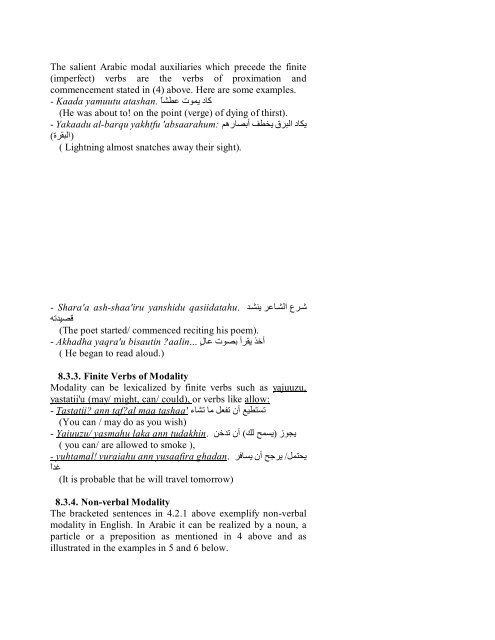- Page 1 and 2:
Translation Theories, StrategiesAnd
- Page 3 and 4:
ContentsPagePreface……………
- Page 5 and 6:
4.2.2. Syntactic Modification Strat
- Page 7 and 8:
PrefaceIt is perhaps axiomatic to s
- Page 9 and 10:
Chapter OnePreliminaries: Definitio
- Page 11 and 12:
the target text we distinguish betw
- Page 13 and 14:
content. The second type deems the
- Page 15 and 16:
features and different accents, qui
- Page 17 and 18:
oadcasting station dar al-idaaahere
- Page 19 and 20:
On the other hand, monolingual audi
- Page 21 and 22:
2.1.The First PeriodThis period sta
- Page 23 and 24:
French humanist Etienne Dolet who h
- Page 25 and 26:
This contemporary period has witnes
- Page 27 and 28:
-representation. These systems requ
- Page 29 and 30:
Chapter ThreeTranslation Theories:
- Page 31 and 32:
is the ‘first systematic investig
- Page 33 and 34:
can be justified on this basis.”
- Page 35 and 36:
3..4.1.1. Informative: It is concer
- Page 37 and 38:
ehaviournon-intentionalintentional
- Page 39 and 40:
3.5 . Sociolinguistic TheoriesThese
- Page 41 and 42:
TT into line with a particular mode
- Page 43 and 44:
SL AuthorTL ReaderSL Encoder Gramma
- Page 45 and 46:
two languages are never identical i
- Page 47 and 48:
comes Webster’s definition of ‘
- Page 49 and 50:
Ideally, Bell (p. 27) rightly maint
- Page 51 and 52:
equivalence in the target language
- Page 53 and 54:
to be very tactful and eclectic in
- Page 55 and 56:
in which the original text undergoe
- Page 57 and 58:
the Arabic emphatic devices such as
- Page 59 and 60:
than stock market. Anani has replac
- Page 61 and 62:
African countries. She coaches the
- Page 63 and 64:
4.2.6. Paraphrasing StrategyContrar
- Page 65 and 66:
Part TwoBasic Theoretical Issues65
- Page 67 and 68:
the native speakers of the two lang
- Page 69 and 70: NiL or zero equivalence wherein the
- Page 71 and 72: ‘dress the child’. To ‘dress
- Page 73 and 74: The above collocations obviously po
- Page 75 and 76: Chapter SixTranslation Loss and Gai
- Page 77 and 78: 6.1.1.2. Levels of Loss6.1.1.2.1. M
- Page 79 and 80: - Then which of the favours 5180Of
- Page 81 and 82: improbable (unlikely to happen) and
- Page 83 and 84: - If Allah willed, He could destroy
- Page 85 and 86: - As for those who reject faith, I
- Page 87 and 88: 6.1.1.2.3. Semantic LevelThis kind
- Page 89 and 90: ecurrent coordinator wa which recu
- Page 91 and 92: According to At-Tabari and Ibn Kath
- Page 93 and 94: (Mushaf Al-Madinah An-Nabawiyah: 18
- Page 95 and 96: Nicholson has not only introduced t
- Page 97 and 98: Chapter SevenTranslation Determinac
- Page 99 and 100: leased for and during the term comm
- Page 101 and 102: .1 .2 .3By the same token, the tran
- Page 103 and 104: A static translation determined by
- Page 105 and 106: .( 21,) .TT:I recalled the long cha
- Page 107 and 108: prone to various interpretations an
- Page 109 and 110: khtar Al-Wakil: "". Hussein
- Page 111 and 112: So much do I love wanderingSo much
- Page 113 and 114: Version 2In your stillness, is ther
- Page 115 and 116: Word-for-word translation do not fi
- Page 117 and 118: Verbal-----commencementyastatii'u r
- Page 119: 8.3. Exemplification8.3.1. English
- Page 123 and 124: 8.5.1.3. ?ala - Kaana ?ala haqq (He
- Page 125 and 126: ()- She will/would keep interruptin
- Page 127 and 128: - As- Safi, A.B. (trans).1980. Taha
- Page 129 and 130: - Hervey, Sandor and Higgins, Ian.
- Page 131 and 132: - Reiss, Katherina. 1977. “Text-t
















